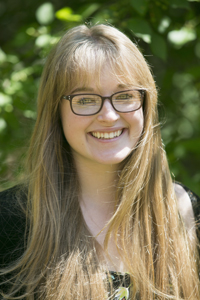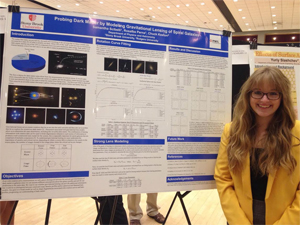Researcher of the Month
September 2015 Samantha Scibelli
Samantha Scibelli
Physics & Astronomy majors; WISE, Class of 2017
Research Mentors: Dr. Rosalba Perna, Physics & Astronomy - Stony Brook & Dr. Charles Keeton, Physics & Astronomy - Rutgers University
As fall classes resume, Samantha Scibelli (class of ’17) is about to travel to Pasadena, California to begin a one-semester internship at the Jet Propulsion Laboratory at NASA!
A Women in Science & Engineering (WISE) junior majoring in both Physics and Astronomy, Samantha has long held a deep passion for these fields, and reflects on being “in awe by how the world works and how we can learn about it through equations and experiments. What drew me to astronomy and physics is the idea that it is the basis of study for the entire universe; from the most elementary of particles, such as neutrinos, up to the largest and most distant galaxy structures studied.” (LTC Biography)
 Since last December, Samantha has been doing astrophysics research with Dr. Rosalba
Perna (Stony Brook University, Physics & Astronmy) & Dr. Charles Keeton (Rutgers University,
Physics & Astronomy) on dark matter, spiral galaxies and gravitational lensing. Her
research project was funded by the PSEG Explorations in STEM program for summer 2015, a 10-week summer research program co-administered by Technology
& Society, the Career Center and URECA that includes professional development activities
as well as a focus on research, and culminated in a poster symposium event this past
August. Samantha had previously engaged in optics research projects at the Laser
Teaching Center, starting in the summer before freshman year, working under the mentorship
of Dr. John Noé. She has presented posters at the URECA campus wide symposia (2014,
2015); as well as the 2013 Frontiers in Optics, OSA Annual Meeting in Florida where
she presented “A study of Evolving Caustics Formed by Evaporating Water Droplets.”
Since last December, Samantha has been doing astrophysics research with Dr. Rosalba
Perna (Stony Brook University, Physics & Astronmy) & Dr. Charles Keeton (Rutgers University,
Physics & Astronomy) on dark matter, spiral galaxies and gravitational lensing. Her
research project was funded by the PSEG Explorations in STEM program for summer 2015, a 10-week summer research program co-administered by Technology
& Society, the Career Center and URECA that includes professional development activities
as well as a focus on research, and culminated in a poster symposium event this past
August. Samantha had previously engaged in optics research projects at the Laser
Teaching Center, starting in the summer before freshman year, working under the mentorship
of Dr. John Noé. She has presented posters at the URECA campus wide symposia (2014,
2015); as well as the 2013 Frontiers in Optics, OSA Annual Meeting in Florida where
she presented “A study of Evolving Caustics Formed by Evaporating Water Droplets.”
Born in Saratoga Springs, and a graduate of Burnt Hills-Ballston Lake High School, Samantha embarked on a long-term astronomy research project starting in her sophomore year of high school working at Rensselaer Polytechnic Institute: Samantha analyzed over 10,000 spectra by eye in the Sloan Digital Sky Survey and found a selection of stars that were not correctly classified by the electronic matching system, work for which she was recognized with an Intel STS finalist award, and which was published in the Astrophysical Journal Supplement series (Census of Blue Stars in the SDSS, ApJS 215 24, Dec. 2014).
Samantha’s long term goals include getting a PhD in Astronomy. Her hobbies at SB include participating in the Astronomy Club, doing science outreach (she was a TechPrep for a WISE middle school summer camp this summer) and playing club field hockey. Below are excerpts of her interview with Karen Kernan, URECA Director.
The Interview
Karen. What is your current research project?
Samantha. I work on gravitational lesnsing research, focusing on dark matter in spiral galaxies.
The first evidence for dark matter came about from the measurements of rotation curves,
which showed that galaxies were rotating too fast accounting for just visible matter.
So what we do is try to model galaxies by their rotation curve, and also by gravitationally
lensing them. We want to see whether gravitational lensing can provide additional
information that would let us distinguish between cored and cuspy density profiles
and/or spherical and flattened halo models. We try to figure out what type of dark
halo model best fits the data so we can learn more about dark matter, its distribution,
its mass, etc. to progress our understanding of dark matter.
I really enjoy what I’m working on! I’ve been working on this project since December
with Professor Rosalba Perna in the Physics & Astronomy department here and with Professor
Chuck Keeton at Rutgers University. (We do a lot by skype.) This summer, I was able
to work on the project as a participant in PSEG Explorations in STEM. I really liked
this program because I had the independence to work on my research, but there was
also structure. We had weekly meetings where I could catch up with people in the
group. I really enjoyed the resume help and the poster session help, and some of the
other weekly activities. And by staying here, I got time to flesh out my project over
the summer.
Was this your first research experience at Stony Brook?
I started research at the Laser Teaching Center, in the summer before I started at
Stony Brook. My first LTC project was looking at caustics formed by evaporating water
droplets. Caustics are important for gravitational lensing — so it was really great
that I was able to become familiar with topics that would be beneficial to the research
I am doing now. I continued in spring of my freshman year at the LTC on a different
project, doing an optical demonstration of gravitational lensing. If you look in the
bottom of a wine glass and you shine a light source through – depending on the angle,
you can see different arcs—similar to how you would see a galaxy being lensed. . .
. Working in the LTC experience was a great experience. It was really nice to have
a summer to explore whatever topic I was interested in learning more about.
That’s great that you were able to get involved in research right away at SB--and
that you had a clear focus on what areas you wanted to explore.
Even from a young age, I’ve always been interested in science. And I had a few experiences
in high school that really drew me to astronomy & physics, and to research. In my
sophomore year, I got involved in a lab at RPI in Troy NY, and I had a wonderful mentor.
I did a project looking at spectra of blue stars in the Sloan Digital Sky Survey –
which is this huge survey publicly accessible to everyone. I looked at over 10,000
spectra of stars and classified them all by eye and found that a good percentage of
them were misclassified. So I reclassified those and found some interesting objects
that can be of use to other astronomers. That research was published in December
2014. I also became an INTEL finalist because of this work.
Can you pinpoint what it is that you enjoy about research?
I enjoy research because I can be really independent. With the research I do, I have
a lot of freedom to do what I want, ask the questions I’m interested in. It’s exciting
to be able to learn something new that nobody else knows about.
I think another reason why I like research is because of the people that I was involved
with. I've always had mentors who are super helpful and supportive.
How does research enhance your education?
I think research is really what makes everything click for me. When taking a class,
you need to know the material in order to take the test to get a grade in order to
move on. But when you’re doing research, you are learning material in order to understand
it for the goal of finding out new information that nobody else knows about. So research
makes you appreciate learning the material more because you know it is going to help
you achieve your goals. When I took a class on galaxies, for example, I knew that
I needed to know about the different mass functions and halo models for the current
research that I would be doing. So it helps that I can see beyond tests when I am
taking a class, that I can see how classroom topics will help with my actual research.
What advice do you have for other students?
Do research if you’re passionate about it and because you want to – not just because
it’s going to look good on your resume. My other advice is: Don’t be afraid to ask
questions or ask for help. Sometimes you might hesitate to ask questions because you
don’t want it to seem like you don’t know what’s going on. But asking questions actually
tells your mentor that you’re putting in the effort to fully understand the research
you are doing.
Do you experience any difficulties when doing research? How do you handle the amount
of new material you have to learn?
Sometimes you hit roadblocks, or you can’t figure things out— and you’re just stuck
trying to debug a program for a week, which happened to me this summer! But that’s
still exciting. Having the right mentor helps too. A mentor will help you through
it.
A lot of the time, you just learn how to figure things out for yourself. Classes help,
and they give you some background knowledge – but they’re not going to be that specific.
It’s really about your independent study when you’re doing research; it’s about the
specifics. You have to teach yourself those things that are not going to be in a class.
I do read a lot of papers – and when we are modeling with new program commands, or
when I'm learning new equations, if I have questions, I ask my mentors. Sometimes
I’ll re-derive equations to make sure I know what’s happening.
Do you enjoy presenting your work?
Poster sessions are a lot of fun! And it also helps with your research. I had the
opportunity to do a lot of science fairs in high school and went to several professional
conferences, so much so that I could tell my high school project in my sleep ... because
I had to say it so many times and do the “elevator speech”. With a new project, though,
I find that there’s still a process you go through of figuring out how to explain
your results in lay terms, figuring out how to make it understandable. It takes time
and practice.
What are your future plans?
I plan to go to graduate school and obtain my PhD, and to continue researching, &
teaching. This next semester, I’m going to be starting an internship to work at NASA
JPL in Pasadena California.
I’m really excited! From travelling to conferences, to being in WISE, and now to getting
the chance to intern NASA...research has always opened so many doors for me.
Tell me more about WISE.
I like WISE a lot because I’m close to all these girls who are interested in similar
things and have the same drive and same passion. I think it’s important to be surrounded
by people who are just as driven as you are. You see incredible students doing incredible
things and it makes you want to strive to do your best and to challenge yourself.
